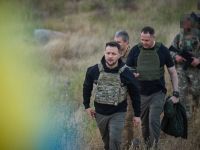U.S. troops being deployed to the Gulf region will need until the end of February to be ready for full-scale war against Iraq, according to Defense officials, quoted by The USA Today on Monday.
The delayed timetable has contributed to the Bush administration's willingness to tolerate extending U.N. weapons inspections beyond a Jan. 27 deadline and into February, the newspaper added.
A senior Defense official said the timing of an invasion to remove Iraqi president, Saddam Hussein, had been shifted from mid-February to the end of February or early March, a delay that stems from the complications of moving a huge land, sea and air force.
The newspaper listed other factors leading to the delay, including Turkey's refusal to host up to 80,000 U.S. ground troops who would invade from the north.
Meanwhile, U.N. arms inspections in Iraq could take around a year to complete, a spokesman for the International Atomic Energy Agency (IAEA) said Monday.
IAEA spokesman Mark Gwozdecky told CNN in an interview that chief U.N. weapons inspector, Hans Blix and IAEA head, Mohamed ElBaradei, had made it clear inspections could take that long. "Dr. Blix and ElBaradei made it very clear as late as last spring that this is an operation that could take in the vicinity of a year and frankly we think it is worth the wait to get a sustainable and long-term peaceful solution.
"It is a far better option to wait a little bit longer than to have to resort to war," he said from Vienna.
He stressed that January 27, the date on which inspectors are scheduled to make a status report on Iraq to the Security Council, was not a make-or-break deadline.
"There's a little bit of misunderstanding about this January 27 reporting date. The (U.N.) Security Council is asking us to report but not to have all the answers at that point."
"We heard unanimous support from the council members that they were four-square behind us, and we believe that they're willing to give us the time that we need," he said.
"It's a big country, it takes a lot of work," Gwozdecky said. "The longer we are there, the more likely we are to detect something... or to deter the Iraqis from reconstituting any capability that they might have."
Blix and ElBaradei are to travel to Baghdad next weekend to confront Iraqi officials over what they say are big gaps in Iraq's arms declaration. (Albawaba.com)
© 2003 Al Bawaba (www.albawaba.com)







